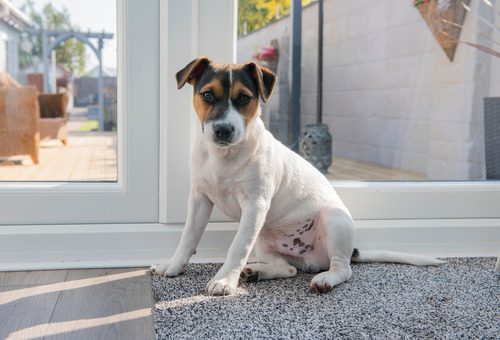Dogs follow a daily rhythm just like we do—and that includes regular bathroom breaks. But sometimes life throws off their routine. Whether you’re dealing with a long car ride, an unexpected schedule change, or a new environment, you might wonder how long your dog can actually go without peeing. So how long can a dog go without peeing, and when should you be concerned? Let’s take a closer look.

Typical Urination Habits for Dogs
Most healthy adult dogs need to urinate three to five times a day. Puppies, seniors, and dogs with certain medical conditions often need to go more frequently. On average, a dog can hold their bladder for about 6 to 8 hours, although this varies based on several factors like age, size, hydration level, and activity.
Age Makes a Big Difference
Puppies have smaller bladders and limited control, so they usually need to go out every 2 to 3 hours during the day. As they grow, their ability to hold it improves, but they still need consistent potty breaks to avoid accidents and discomfort. Senior dogs may also experience more frequent urination needs due to reduced muscle tone or underlying health changes.
Size and Breed Matter
Smaller breeds often need more frequent bathroom breaks than larger dogs. While it’s not an exact science, size can impact bladder capacity. A large-breed dog may comfortably go longer between potty breaks than a toy breed with a much smaller bladder.
How Long Can a Dog Go Without Peeing?
A healthy adult dog can typically go 8 to 10 hours without urinating—but that doesn’t mean they should. Holding it in for too long isn’t ideal. In fact, consistently waiting that long can lead to discomfort and increase the risk of urinary tract issues. If you’re ever unsure about your dog’s schedule, it’s best to err on the side of more frequent breaks.
Overnight Holding
Many adult dogs sleep through the night without needing to go out. It’s common for them to hold it for 8 to 10 hours while sleeping, especially if they’re well-exercised and had a chance to relieve themselves before bed. Puppies and senior dogs, on the other hand, may need a middle-of-the-night potty break.
In Unusual Situations
Some dogs can hold it longer when they’re anxious, unwell, or in unfamiliar surroundings. This might happen during travel, boarding, or when they’re adjusting to a new environment. While it may not cause immediate harm, it’s important to monitor their behavior. If a dog consistently goes too long without peeing, it could indicate stress or a medical concern.
Risks of Infrequent Urination
If your dog doesn’t pee often enough, it can cause more than discomfort. Holding urine for extended periods increases the chance of urinary tract infections, bladder stones, and other urinary health problems. These issues can become serious if left unaddressed, so it’s important to recognize when something isn’t right.
Discomfort and Behavioral Changes
When a dog needs to urinate but can’t, they may show signs of distress. Pacing, whining, restlessness, or accidents in the house can all point to an overfull bladder. Some dogs may even become withdrawn or irritable. These behavioral shifts often reflect physical discomfort that needs attention.
Long-Term Health Concerns
Repeatedly holding urine for too long can contribute to infections or inflammation in the urinary tract. Over time, this can lead to bladder damage or kidney issues. Dogs that don’t pee regularly are also more prone to developing bladder stones, which can block the flow of urine and require urgent veterinary care.
What to Watch for If Your Dog Isn’t Peeing
If your dog hasn’t peed in 12 hours or more, or if you notice changes in their urination patterns, it’s time to take a closer look. Sometimes, medical issues prevent a dog from urinating normally. Other times, it could be related to anxiety or environmental stress.
Potential Medical Concerns
- Urinary Tract Infection (UTI): Dogs with UTIs may strain to urinate or pass small amounts frequently.
- Bladder Stones: These can block the flow of urine and cause pain or even life-threatening complications.
- Kidney Problems: Dogs with kidney issues may urinate less often or in unusual amounts.
- Neurological Issues: Damage to the nerves controlling the bladder can interfere with urination.
If you notice signs like straining, blood in the urine, discomfort, or a distended abdomen, contact your veterinarian immediately. Dogs in Acworth who show any of these symptoms should be seen at Mills Animal Hospital. Please call (770) 903-5995 to schedule an exam.
Factors That Influence Urination Frequency
Urination habits can shift based on several internal and external factors. Here are a few that can cause temporary or ongoing changes in your dog’s routine.
Hydration and Diet
Dogs that drink more water—either due to increased activity, hot weather, or a high-moisture diet—will usually need to urinate more often. Conversely, dogs that aren’t drinking enough may not urinate as frequently. Make sure fresh water is always available and monitor their intake throughout the day.
Activity Level
Exercise stimulates your dog’s body, including their digestive and urinary systems. Dogs that are active throughout the day may urinate more frequently than those who are sedentary. Walks, playtime, and mental stimulation all contribute to a more regular bathroom schedule.
Routine and Environment
Changes in routine can impact your dog’s urination schedule. Moving to a new home, traveling, or having guests in the house can all affect your dog’s comfort level and behavior. Some dogs may hold it because they feel unsafe or unsure about where they’re allowed to go. A consistent, calm environment helps maintain healthy habits.
Supporting Healthy Bathroom Habits
Staying in tune with your dog’s urination patterns is a helpful way to track their overall well-being. Regular walks, consistent feeding and water schedules, and close observation will help you spot anything out of the ordinary. If something seems off, it’s always worth checking in with your veterinarian.
When to Schedule a Veterinary Visit
If your dog hasn’t peed in 12 to 24 hours, is straining, or shows signs of discomfort, don’t wait. Call Mills Animal Hospital in Acworth at (770) 903-5995 to discuss your concerns. We’re here to help you understand what’s normal and what may need further attention. It’s always better to act early than wait for symptoms to worsen.
